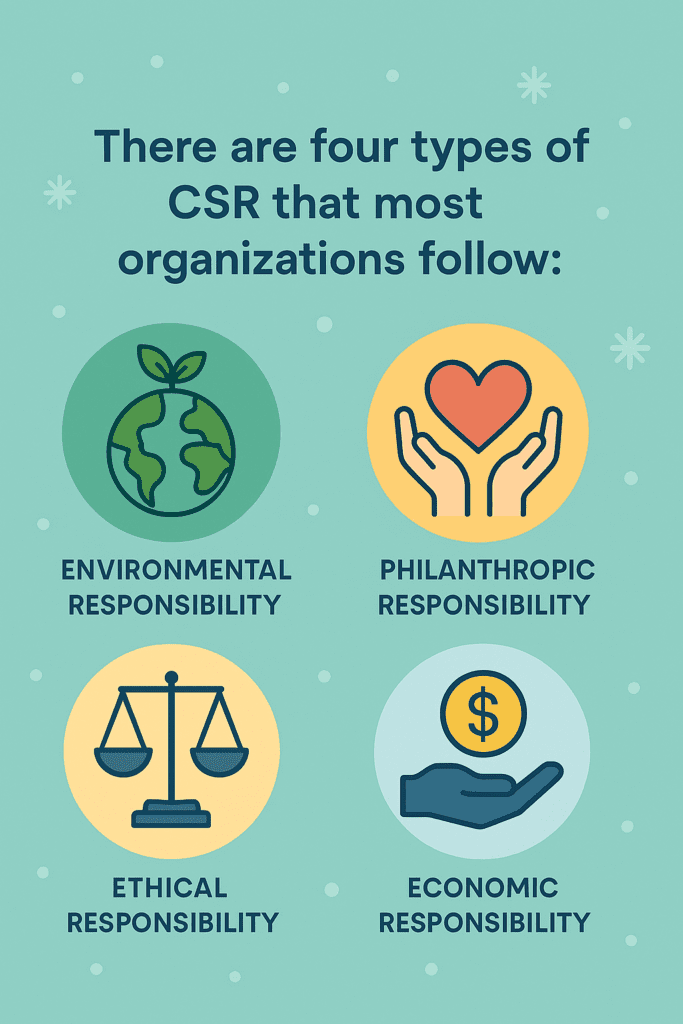Corporate Social Responsibility (CSR) is no longer just a buzzword—it has become a strategic necessity for businesses worldwide. Companies today are not judged only by their profitability but also by their contribution to society, the environment, and ethical governance. To implement CSR effectively, it is crucial to understand the types of corporate social responsibility and the benefits they bring to both businesses and communities.
In this blog, we’ll explore the four types of CSR, how they impact business sustainability, and why integrating them into corporate strategies leads to long-term growth.
Understanding the Types of Corporate Social Responsibility
CSR can be defined as a company’s responsibility to operate ethically while creating a positive impact on society and the environment. Businesses that adopt CSR practices go beyond legal obligations and actively contribute to sustainable development.
There are four types of CSR that most organizations follow: environmental, ethical, philanthropic, and economic responsibility. Let’s dive deeper into each.

1. Environmental Responsibility
The first and most widely recognized form of CSR is environmental responsibility. As climate change and sustainability issues dominate global conversations, businesses are expected to reduce their ecological footprint.
Examples of environmental CSR include:
- Reducing carbon emissions through renewable energy adoption.
- Implementing green business practices like recycling and waste reduction.
- Promoting sustainable supply chains and eco-friendly packaging.
Benefits: Companies that embrace environmental responsibility not only help protect the planet but also enhance their reputation, attract eco-conscious customers, and often reduce operational costs in the long run.
2. Ethical Responsibility
Ethical responsibility focuses on doing business fairly and ensuring that stakeholders are treated with respect and integrity. This includes maintaining ethical business practices, ensuring diversity and inclusion, and protecting consumer rights.
Examples of ethical CSR initiatives include:
- Transparent communication with customers and investors.
- Implementing fair labor practices in supply chains.
- Commitment to workplace diversity and inclusion.
Benefits: Ethical responsibility builds trust among employees, customers, and investors. Companies that act ethically are more likely to enjoy long-term loyalty, attract skilled talent, and avoid reputational risks.
3. Philanthropic Responsibility
Philanthropic responsibility involves a company’s efforts to give back to society. This goes beyond compliance or profits and reflects genuine concern for community welfare.
Common philanthropic CSR activities include:
- Donating to charitable causes.
- Supporting education and healthcare initiatives.
- Sponsoring community development programs.
- Encouraging employees to volunteer in local communities.
Benefits: Philanthropy strengthens community relations, improves brand perception, and positions the company as a socially conscious leader. Moreover, employees often feel more engaged and motivated when they work for an organization that gives back to society.
4. Economic Responsibility
The fourth type of CSR—economic responsibility—ensures that businesses operate in a financially sustainable manner while benefiting society. Unlike traditional profit-driven goals, economic responsibility balances financial performance with social and environmental considerations.
Examples include:
- Practicing responsible investing in sustainable industries.
- Ensuring fair wages and employee benefits.
- Supporting local businesses and suppliers.
Benefits: By aligning financial growth with societal benefits, companies can achieve long-term stability, enhance stakeholder trust, and contribute to economic development.
Why Businesses Should Embrace CSR
Understanding the types of CSR with examples helps organizations see the bigger picture. CSR is not just about compliance; it’s about building a purpose-driven business that resonates with stakeholders.
Key Benefits of CSR:
- Enhanced Brand Image – Customers are more likely to support businesses that act responsibly.
- Employee Engagement – Workers feel proud to be associated with ethical and philanthropic initiatives.
- Competitive Advantage – Strong CSR practices differentiate companies in crowded markets.
- Risk Management – Ethical and transparent practices reduce legal and reputational risks.
- Sustainable Growth – Integrating CSR fosters long-term business resilience.
Final Thoughts
The four types of CSR—environmental, ethical, philanthropic, and economic responsibility—serve as a framework for companies to contribute positively to society while achieving sustainable business growth. Organizations that integrate CSR into their core strategies not only strengthen their reputation but also create lasting value for stakeholders.
In today’s world, being socially responsible is no longer optional—it’s a business imperative. Companies that adopt the types of corporate social responsibility proactively will stand out as leaders, attract loyal customers, and ensure long-term success.



